The Department of Electronics and Communication Engineering (ECE) is one of the major Departments of GITA, Bhubaneswar, since its inception in the year 2004. It is very active in Teaching and Research in the areas of Communications and Signal Processing, Machine Learning, Microelectronics and VLSI and Electronic Systems. The Department is equipped with the state of the art Modeling, Computational, Experimental, Software Simulation facilities for carrying out Industry sponsored and consultancy Research and Development (R&D) projects in various fields. Global Excellence in Teaching, Research and Technology development is the main concern of the Department. It has renowned as well as young and dynamic personalities as faculty and involved in providing Quality Education at Undergraduate (UG) level. The Department has Industry interaction and signed MoU for the development of the students by conducting guest lectures, seminars, workshops and industrial visits. The excellent placement record for the last several years shows our determination with a rise to incorporate the fast changing technological trends in the field of ECE.
The department has latest software like: NI Labview, Xilinx (University Bundle), MATLAB. The department regularly conducts International and National Conferences, Workshops and Seminar on latest advancements in technology. The department has successfully organized national conference (ETICT-2011) and International conference on swarm intelligence and Evolutionary computation (ISSWEC-2012) to expose the students the students to the outside world. The ECE students are always industry ready with all the above benefits.
In the future, the department hopes to extend its research into newer areas like Energy Efficient Networks, Body Area Networks, High Precision Location and Navigation, Green Communication and Computing, Organic Electronics, Cyber-Physical Interfaces, Healthcare Informatics, Millimeter Wave Systems Imaging, Antenna Design, Bio-medical Imaging etc.
Mission:
The mission of the ECE Department is to impart quality education to students: Who will be able to compete internationally and to produce creative solutions as per needs of the society. Further to be conscious of the universal moral values, adhering the professional ethical code, and to generate and disseminate knowledge and technologies.
Vision:
1. To become a nationally and internationally recognized Department in imparting higher learning, building upon the culture and values of universal science and contemporary education.
2. To become a centre of research and education generating knowledge and technologies this lay the ground work in shaping the future in the field of electronics and communication engineering as per the need of the nation.
The laboratory facilities available in the department are as under:
- Basic Electronics
- Analog Electronics
- Digital Electronics
- Microprocessors & Microcontroller
- Communication Engineering
- Analog Communication Technique
- Digital Communication Technique
- Digital Signal Processing
- Microwave Engineering
- VLSI Design
- Project Lab
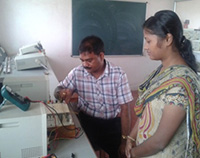 C Programming Lab
C Programming Lab
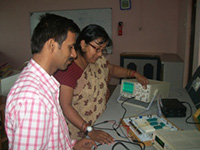 Analog Electronics Lab
Analog Electronics Lab
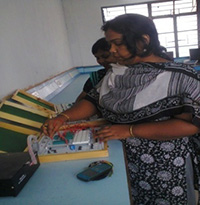 Digital Electronics Lab
Digital Electronics Lab
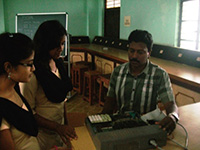 Microprocessor & Microcontroller Lab
Microprocessor & Microcontroller Lab
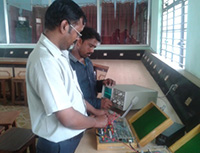 Analog Communication Technique Lab
Analog Communication Technique Lab
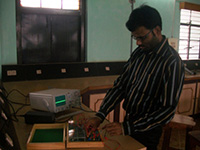 Digital Communication Lab
Digital Communication Lab
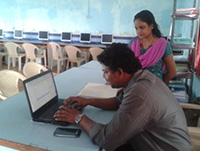 Digital Signal Processing Lab
Digital Signal Processing Lab
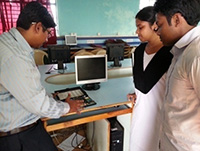 VLSI Lab
VLSI Lab
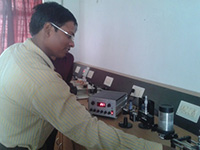 Microwave Engineering Lab
Microwave Engineering Lab
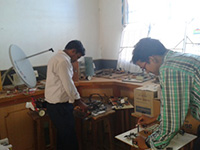 Project Lab
Project Lab
The B.Tech program aims at providing a strong foundation in theoretical, practical and design aspects of Electronics and Communication Engineering (ECE). The curriculum covers all areas of electronics and communication engineering under the broad categories (theory and laboratory courses ) of electronic circuits, electronic devices, signal processing and communication, VLSI Design, Microcontroller. The theory course can be either a core or an elective course. Each theory course has a laboratory component, which provides a balanced mix of quality teaching of Theoretical concepts and experimental verification of the learnt concepts.
There are exclusive laboratory courses aimed at imparting the design knowledge of electronic circuits. The development of laboratory project in the seventh and Eighth semesters are aimed at providing opportunities to the students and guiding them to develop new electronic systems useful for real applications using theoretical, practical and design knowledge learnt so for. The elective courses are aimed at imparting knowledge in the specialized and state of the art topics in the broad categories mentioned above. Thus the B.Tech program offered by the department provides an ample opportunity for the aspiring students to become Electronics and Communication Engineers with sufficient knowledge to take up the Engineering profession.
Research groups & Labs
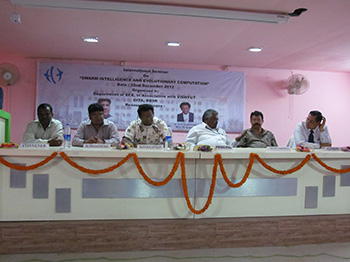
Listed below are some of current active research groups in ECE Department at GITA, Bhubaneswar
Adaptive Systems and Control
Embedded Real-Time Technologies in Application
VLSI Design
Microcontroller
Optical Multiuser/Multichannel Communications
Image and Video Analysis (VIVA)
Mobile Communication
Sensor and social network
Optical fiber communication
Data Mining and its applications
Publications by our faculty in Journals and Conferences
| Level | Total No of Papers |
|---|---|
| International Journal | 55 |
| National Journal | 8 |
| International Conference | 15 |
| National Conference/Seminar | 20 |
Honors and remarkable achievements of our faculty
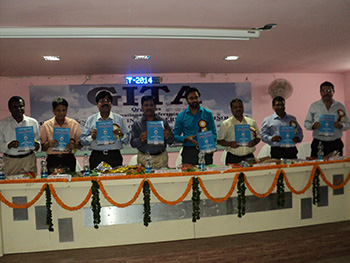
Research supervisor for guiding Ph.D candidates
Editorial Board Member in International / National Journals.
Reviewer in various reputed International Journals and Books.
Technical Advisory Committee Members for International / National Conferences.
Published Text Books
Conferences / Seminars / Winter / Summer Schools Organized for Faculty
Organized International Conference on Recent Innovations In engineering and Technology (RIET-2014) during 19-20, April 2014. Proceedings by IRNet Press.
Organized International Conference on Swarm Intelligence and Evolutionary Computation (SWAEC-2012).
Organized National Conference on emerging trends in information and communication technology (ETICT-2011).
Organized 2 Two Days workshop on PCB design, in association with EFY, New Delhi, during 2011-12, 2012-13.
Cognitive Radio
MATLAB and its application in Engineering
Cryptography and coding techniques
Signal Processing, System identification, Smart Grid, optimization techniques
Optimization in wireless communication
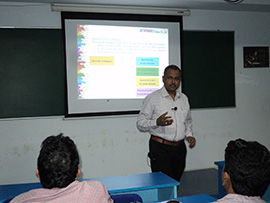
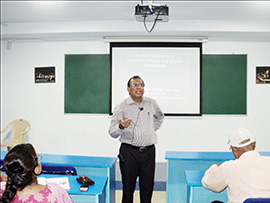
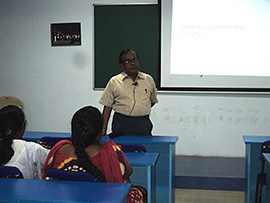
Students Achievements
University Ranks
Publication of student’s project in journal of repute.
Participation of students in Symposia, Conferences at National & International level
Participation in sports and won prizes
IETE Organizational Member
Being the member of IETE, the following are the benefits to the students and faculty:
All the members of IETE Students Forum can utilize the IETE Journal of Education, IETE Technical Review, IETE Journal of Education and Journal of Research (4 issues per year) free of charge by ISF and also have priority for publishing their papers in this Journal of Education received.
They can also subscribe for other publication of the IETE viz. IETE Journal of Research and IETE Tech Review at fifty percent of subscription rate.
They are also welcome to attend all IETE technical programmes arranged in India at a reduced registration fee.
Students will be given reduction of the amount paid at the time of ISF for becoming Associate Member of IETE.
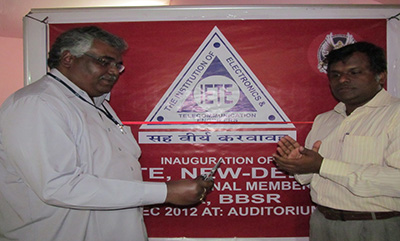
About ISTE
The Indian Society for Technical Education is a national, professional, non-profit making Society registered under the Societies Registration Act of 1860. The major objective of the ISTE is to assist and contribute in the production and development of top quality professional engineers and technicians needed by the industries and other organizations. Being the only national organization of educators in the field of Engineering and Technology, ISTE effectively contributes in various missions of the Union Government. The Ministry of Human Resource Development, CTE / DST / MIT / State Governments are well associated with the ISTE for programmes relating to technical education. The Headquarters of ISTE is located at New Delhi.
Major Benefits of becoming an ISTE member
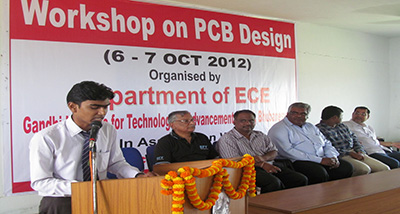
A Member of a National Professional Organisation
Join an academic fraternity of over 50,000 strong professionals
Preference to attend short-term training programmes for academic excellence and to become eligible for career advancement opportunities
Bi-monthly Newsletter
Quarterly Indian Journal of Technical Education (at concessional rates)
Quarterly International Journal of Engineering Education by American Society of Engineering Education (ASEE), USA (at concessional rates)
Eligible to apply for various national level awards
Publications for Self Development, Institution Development, etc. (at concessional rates)
Eligible to participate in Chapter Level, Section Level and National Level Conferences, Workshops and other activities of your academic interest, etc.
Workshop Organized for Students
A National Level Students Technical workshop .Organized on latest developments in the field of Electronics and Communication Engineering as listed below
PCB Design and Fabrication by EFY
Algorithms using MATLAB
VLSI and Embedded technology
Digital Signal Processing
Robotics
Programmable System on Chip
Digital Image Processing using Matlab
LABVIEW
GATE Coaching
Students are given extra care for comprehensive and rigorous GATE coaching by our experienced Faculty members for the Graduate Aptitude Test in Engineering (GATE) and various Government and Public Sector Unit Jobs.
It is managed by a highly experienced and committed team of professionals, which includes M. Tech degree holders from reputed institutes. With their in-depth understanding of GATE pattern and GATE papers, they provide student-centred coaching focusing on individual strengths and weaknesses of each student. Our aim is to help budding engineers discover and exceed their intellectual potential.
GATE Rank Holders
Our top rank holders are joined in IITs,NITs and Top Engineering collages of India.
Further Education
After completing a B. Tech/BE students can opt for M. Tech/MS in various subjects such as Fiber Optics and Light waves, Microelectronics & V L S I Design, RF and Microwaves, Telecommunication Systems, and Embedded Systems.
Job Profiles
You can work in the consumer electronics, aviation and avionics, manufacturing, electricity generation and distribution, communications, transportation, telecommunications, radio and television, computer applications, hospital diagnostic equipment and offshore industries.
Top Recruiters
BEL DMRC Siemens Texas Instruments Infosys Intel Philips Electronics Motorola Samsung DRDO ISRO IBM TCS
The Portal
This serves as a common platform where the seniors can pass on information to the juniors and also acts as the store house of "everything" happening in the department of ECE.
Magazine
VIDYUT -A yearly magazine contributed by students, Staff and Alumni
Contests
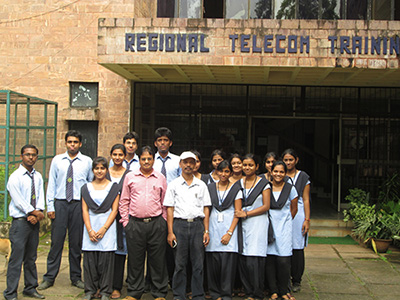
Name of the contest
Paper Presentation Contest
Quiz Contest (Technical & Non-Technical)
Multimedia Contest
Hardware Contest (Design and Debugging contest)
Software Contest
Debugging contest in C Language
Electronics Hobby Club
The department of ECE has formed ''Electronics Hobby Club'' with the objective of providing the students a platform for applying their knowledge and creativity in the field of electronics. The club is open to all students of the college who are interested in trying their hands at electronics.
Robotic society
A student-led club aiming to increase robotics interest at GITA and across country. We run workshops, competitions and lectures to teach about robotics, electronics and software as well as providing help (financial and technical) to students looking to start a robotics project. We also run several robotics beginners courses and have also recently won the highly prestigious award for our outstanding courses and robotics talks.
PEOs
PEO1: Our graduates will apply their knowledge and skills to succeed in an electronics and communication engineering career and/or obtain an advanced degree.
PEO2: Our graduates will apply basic principles and practices of computing grounded in mathematics and science to successfully complete hardware and/or software related engineering projects to meet customers’ business objectives and/or productively engage in research.
PEO3: Our graduates will function ethically, responsively and will remain informed about all the developments of their profession.
PEO4: Our graduates will successfully function in multi-disciplinary teams.
PEO5: Our graduates will be able to perform competently in a diversified environment and individually, within a global, societal, and environmental context with ethical and moral behavior.
POs
PO1. Engineering knowledge: Apply the knowledge of mathematics, science, engineering fundamentals, and an engineering specialization to the solution of complex engineering problems in electronics and communication engineering.
PO2. Problem analysis: Identify, formulate, review research literature, and analyze complex electronics and communication engineering problems reaching substantiated conclusions using first principles of mathematics, natural sciences, and engineering sciences.
PO3. Design/development of solutions: Design solutions for complex electronics and communication engineering problems and design system components or processes that meet the specified needs with appropriate consideration for the public health and safety, and the cultural, societal, and environmental considerations.
PO4. Conduct investigations of complex problems: Use research-based knowledge and research methods related to electronics and communication including design of experiments, analysis and interpretation of data, and synthesis of the information to provide valid conclusions.
PO5. Modern tool usage: Create, select, and apply appropriate techniques, resources, and modern Electronics and communication engineering and IT tools including prediction and modelling to complex engineering activities with an understanding of the limitations
PO6 The engineer and society: Apply reasoning informed by the contextual knowledge to assess societal, health, safety, legal and cultural issues and the consequent responsibilities relevant to electrical engineering practice.
PO7. Environment and sustainability: Understand the impact of the professional engineering solutions in societal and environmental contexts, and demonstrate the knowledge of, and need for sustainable development.
PO8. Ethics: Apply ethical principles and commit to professional ethics and responsibilities and norms of the engineering practice.
PO9. Individual and team work: Function effectively as an individual, and as a member or leader in diverse teams, and in multidisciplinary settings.
PO10. Communication: Communicate effectively on complex engineering activities with the engineering community and with society at large, such as, being able to comprehend and write effective reports and design documentation, make effective presentations, and give and receive clear instructions.
PO11. Project management and finance: Demonstrate knowledge and understanding of the engineering and management principles and apply these to one’s own work, as a member and leader in a team, to manage projects and in multidisciplinary environments.
PO12. Life-long learning: Recognize the need for, and have the preparation and ability to engage in independent and life-long learning in the broadest context of technological change.
PSOs
PSO1.Professional Skill: Skill to apply the notion in electronics and communication engineering to design, develop and suitable implementation in complex model analysis, specific to VLSI & embedded and communication system.
PSO2.Innovative Skill: An ability to explore new ideas in the field of ECE with the help of high quality technical throughput through software and hardware learning environment